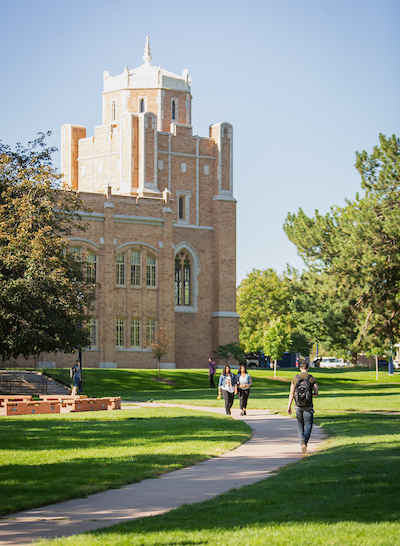It’s been a Colorado institution for the last 135 years. But in many ways, Greeley’s University of Northern Colorado remains a mystery to a good portion of the state’s population. Of course, the state’s population has exploded over the last thirty years, so that could be a reason. But UNC President Andy Feinstein is telling anyone who’ll listen, it might be a good time to begin paying attention. This school has a lot to say about Colorado’s future.

The school has been an educational beacon for thousands of students—many if not most from northeastern Colorado—since its founding in 1889 when it was called the State Normal School of Colorado. It has also undergone a number of formal iterations but since 1970 has been the University of Northern Colorado.
The school also has its share of distinguished alumni, including Pulitzer Prize winning author James Michener and, more recently, ‘Sully’ Sullenberger, the pilot who in 2009 safely landed US Airways flight 1549 on the Hudson River after a bird struck an engine.
And while its past is important, said Feinstein, its future holds a promise that will likely make Colorado sit up and pay attention. And, despite his background in the hospitality industry, it’s more promise than puffery.
The school has recently earned designation as a Hispanic Serving Institute. Schools designated HSI are those whose undergraduate enrollment is 25 percent Hispanic or higher. “HSI is very important to us,” said Feinstein in a recent telephone interview.
The HSI designation, while significant to UNC, is not altogether unfamiliar to Feinstein. Previous stops along his academic path, including the University of Nevada Las Vegas and Cal Poly Pomona, have also been HSI institutes.
Feinstein says the HSI tag is like a beacon in that it “provides recognition of what we are doing.” It also “opens doors to additional federal funds in the form of competitive grants specifically designed to support HSI’s in improving their academic quality and service to students.” Beyond that, said Feinstein, the designation helps create “programs that steer students to STEM disciplines,” and can help them in paying bills (tuition) when circumstances apply.
In Colorado where more than 30 percent of all high school graduates are Hispanic with twice that number in the Greeley-Evans School District, the HSI designation may inspire more students to think more seriously about college and UNC.
Feinstein does not see HSI as an ending but rather another new and exciting chapter for UNC and all of its students. He also includes faculty—a diverse faculty—as part of his long term plans for his school. “I want the diversity of our faculty to reflect the diversity of our students.
Diversity, Equity and Inclusion (DEI), three values applied to bring more people into a position of success, is something Feinstein believes adds educational quality. Applying DEI and HSI, said Feinstein, also means opportunity. The university he said will do everything it can to parlay both, especially in promoting science and health professions.
Currently UNC’s faculty, including both full and part-time, totals 679. But only 8 percent is Hispanic/Latino. Of the school’s 1,508 full and part-time employees, only 277 or 18 percent are Hispanic/Latino.
A study conducted by UNC estimated its economic impact on Larimer and Weld counties is estimated at $544.2 million and more than 8,400 jobs. But a planned College of Osteopathic Medicine, with an expected first class in 2025, could elevate that figure significantly. Cutting the ribbon on the planned UNC medical school—the third in Colorado—will cost a minimum of $200 million. A bill now moving in the state legislature asking for $169 million is under consid- eration. Donors and grants will be required to cover the total amount. The Weld County Trust has committed $25 million.
Because of the population boom in Colorado, there now exists a shortage of physicians and a particular deficit in rural areas. A study by the Health Resources and Services Administration stated that only 35 percent of what is needed to serve the state is now being met. HRSA also stated that only four of Colorado’s 63 counties meet accepted levels of health care professionals.
Feinstein said the UNC Hispanic Serving Institution designation, along with the planned College of Osteopathic Medicine, may also entice more of UNC’s Latino students to pursue careers in healthcare and keep them close to home and help reduce the growing deficit of healthcare profes- sionals across the eastern part of Colorado.
Feinstein said the work to put in place what is needed for the planned new college has already begun, including the hiring of a dean. Establishing the new facility, he said, is essential. Once the new college is operational, it is expected to produce “150 doctors a year.” But the economic ripples will extend well past new physicians. Feinstein said it will add as much as $1.5 billion to the state economy with jobs and ancillary workforce opportunities in the form of health care workers, new housing and complementary employment within a decade of its start. “It’s a big return on investment.”
Now in his sixth year at UNC, Feinstein said he has tried to create an inclusive environment at the Greeley school. “I have always enjoyed engaging with students,” he said. “It’s what brings me joy and energy.” He frequently invites students and faculty to his home for dinners and meet-and-greets. “When I talk to them, they know exactly why I’m here.” He also makes it a point to dine among the students at the university food hall.
He also said that while his background has meant stops at UNLV and San Jose State University, both million-plus population urban universities, Greeley has been far more than he expected when he was named president. Now he wants the state to also take notice.




